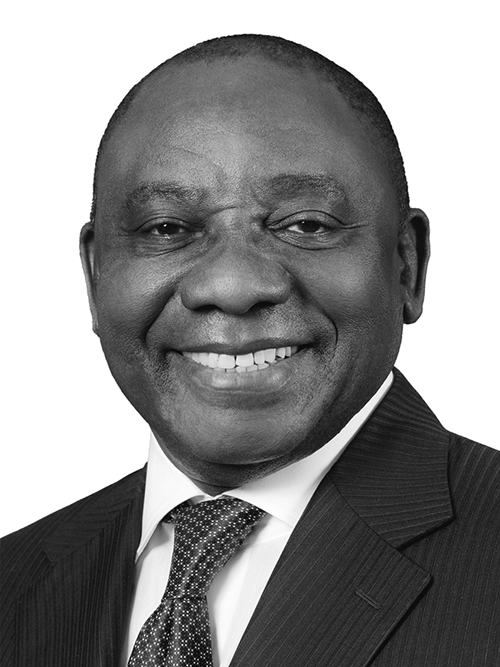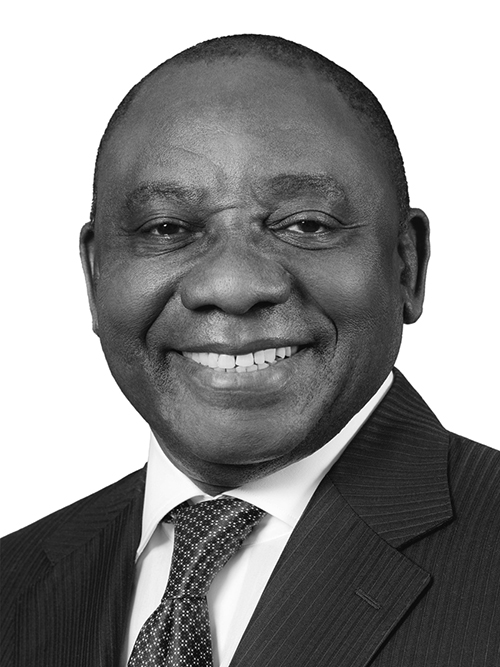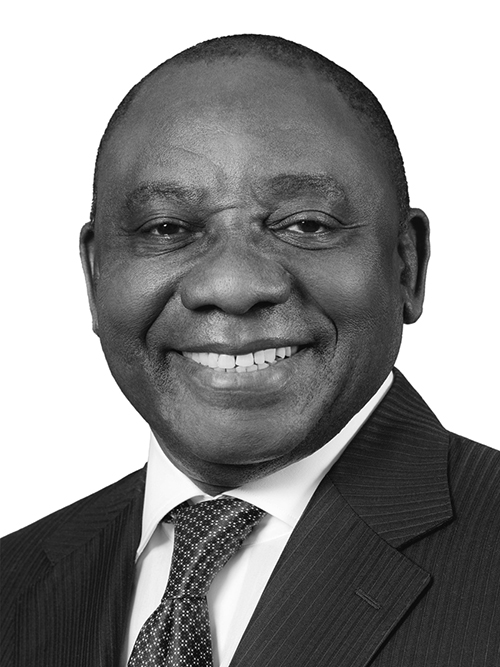Programme Director,
Vice Chancellor of the University of South Africa,
Members of the Eminent Persons Group,
Distinguished delegates,
Representatives of civil society,
Traditional leaders,
Faith-based organisations,
Business and labour leaders,
Youth and women’s movements,
Leaders and representatives of political parties,
Esteemed guests and, most importantly,
Fellow South Africans
I welcome you all to this historic gathering.
I have called this first National Convention in my capacity as the Head of State.
I have done so in line with Section 83 of our Constitution, which requires the President, as the Head of State and head of the national executive, to promote the unity of the nation and that which will advance the Republic.
I should thank everyone here today for accepting this invitation.
Today marks the first sitting of the National Convention of the National Dialogue, a space where we confront our realities openly, respectfully and constructively.
This is not a partisan platform. This is a national platform.
Here, no voice is too small and no perspective is too inconvenient to be heard.
We are gathered to listen to each other, to understand one another and to chart a common path forward for our country.
We meet at a time of profound challenges: economic hardship, unemployment, inequality, growing poverty and a crisis of confidence in our institutions.
We also meet at a time when the world is rapidly changing and our ability to adapt and renew ourselves will define the next generation.
But history teaches us that nations are not defined solely by their difficulties; they are defined by how they respond to challenges they face.
Our own struggle for freedom from the nightmare of apartheid proved that unity in diversity is not an abstract slogan. It is a powerful force for transformation.
Gathered in this hall are people from all across our land, people from all walks of life, people of all races, all classes, all languages and cultures.
Gathered here, at this National Convention, are farmers and informal traders, civic activists and policy makers, traditional leaders and waste pickers, industrial workers, unemployed men and women, unemployed young people, unemployed graduates, religious leaders, business people and public servants.
There are young people and older persons, men and women, people from informal settlements and rural villages. There are people with disabilities. There are survivors of various forms of violence. There are artists, sports people and cultural activists.
In this National Convention has gathered the rich diversity of the people of this country.
Yet, although we are different in many ways, although we represent different experiences and hold different views, there is one thing we have in common.
We are all South Africans.
We are, each one of us, sons and daughters of the same soil.
We share a common past.
We share the same inheritance of division, of inequality and of injustice.
We share the same pride at ending the crime of apartheid and establishing a constitutional democracy.
We also share a common future.
And that is why we have chosen to gather here today.
Because each one of us, regardless of our differences, is committed to work together to build the future of which we all dream.
We have chosen to be here because we believe in the power of dialogue and united action.
We believe that if we share our concerns and fears, we can conquer them.
If we understand the challenges we face, we can overcome them.
If we know what hurts us, we can heal. If we know what divides us, we can unite.
We gather here today, in all our diversity, to launch a National Dialogue.
We are embarking on a process that will launch a million conversations.
Across the length and breadth of South Africa, people will and must meet to talk of what worries them, what gives them hope and how they think their lives and our country can be better.
This initiative is about what all South Africans must do – together – to make our lives and country better.
Through this process we want our people to meet in homes and community halls. We want them to meet in churches, synagogues, mosques and temples. Our people must meet in schools and lecture halls, in boardrooms and on the shopfloor, on the pathways of our villages and the streets of our townships and our cities.
We will meet online. We will call into radio stations. We will debate on television.
We will share our views and make our suggestions without hesitation. We will be direct and honest.
We will need to have difficult conversations about many issues, including:
Why do South African women have to live in fear of men?
Why do so many people live in abject poverty and so few live lives of opulence?
Why, after decades of democracy, are the prospects for a white child so much better than those of a black child?
Why do women get paid less than men for the same work?
Why, when we have a Bill of Rights, are LGBTQI+ people still discriminated against, stigmatised and harassed?
Why do clinics run out of medicine? Why do taps run dry?
These are some of the questions that we must be willing to ask and which we must be prepared to answer.
But more than that.
These are the challenges that we must be ready to do something about – as individuals, as organisations, as communities, as parents, as elected representatives, as public officials.
The National Dialogue is a call to debate and to discuss.
More importantly, the National Dialogue is a call to action.
It is a call to all South Africans to seize this moment for change and progress.
It is a call to build a society in which there is a place for everyone, where the country’s wealth is shared by all. A South Africa that truly belongs to all who live in it.
We have come together in this National Convention not to have the dialogue, but to start the dialogue.
Gathered here are more than 1,000 people from over 200 organisations across all sectors of society.
Our task is to prepare for the thousands of public dialogues that will happen in communities across the country over the next six to eight months.
We are here to consider some of the themes that may arise in these discussions, understanding that it is ultimately the people of this country that will determine the issues that should be discussed.
We are here to reflect on how we should approach these public dialogues, what methods we should use to ensure that everyone has a say and that the discussions take place in an environment that promotes understanding and that encourages healing.
Through this National Convention we seek to equip delegates to be champions and enablers of these public dialogues.
We seek to ensure that we give the space to South Africans to define the outcome of the National Dialogue process – so that these thousands of conversations can be drawn together into a clear vision for the country and an agreed programme of action into the future.
Through the National Dialogue process, we hope to arrive at a social compact that will outline the role and responsibilities of all of us – as citizens, as the arms of the state, as business, labour, traditional leaders, religious bodies, civil society, activist and civic organisations.
This National Dialogue must be about citizens taking responsibility for their future.
Through the dialogues, people must be able to attend to the challenges where they live or work or study.
They must be able to hold their public representatives accountable and ensure that all public institutions fulfil their responsibilities.
This National Convention is the moment at which the people of South Africa take over the National Dialogue.
For more than a year, various formations of civil society have been working to conceptualise and champion the National Dialogue.
Central to this effort have been a number of legacy Foundations established by and named for stalwarts of our liberation struggle.
We express our gratitude and appreciation for the work of these Foundations in giving life to the National Dialogue.
We also thank all those from civil society, government departments, provincial governments, state owned enterprises and business who have worked tirelessly to bring this National Convention together.
We are extremely grateful to the Vice Chancellor, leadership and staff of UNISA for hosting this National Convention and providing the facilities and services that have made it possible.
I wish to thank the members of the Eminent Persons Group, all of whom graciously and enthusiastically accepted my invitation to serve as the champions and guarantors of the National Dialogue.
These esteemed South Africans are:
- Dr Brigalia Bam, former Independent Electoral Commission Chairperson,
- Mr Robbie Brozin, entrepreneur and business person,
- Judge Edwin Cameron, former Constitutional Court judge,
- Mr Manne Dipico, former Northern Cape Premier,
- Dr Desiree Ellis, Banyana Banyana coach and football legend,
- Ms Ela Gandhi, peace activist and stalwart,
- Ms Nomboniso Gasa, researcher and rural activist,
- Mr Bobby Godsell, business leader,
- Dr John Kani, award-winning actor,
- Mr Siya Kolisi, Springbok captain and world champion,
- Ms Mia le Roux, Miss South Africa 2024,
- His Grace Bishop Barnabas Lekganyane, leader of the Zion Christian Church,
- His Grace Bishop Engenas Lekganyane, leader of the St Engenas Zion Christian Church,
- The Most Reverend Thabo Makgoba, Anglican Archbishop of Cape Town,
- Prof Tinyiko Maluleke, Chairperson of the National Planning Commission,
- Dr Barbara Masekela, poet, educator and stalwart,
- Ms Lindiwe Mazibuko, former Member of Parliament,
- Mr Roelf Meyer, former Minister and constitutional negotiator,
- Ms Gcina Mhlope, storyteller, writer and actor,
- Ms Nompendulo Mkhatshwa, former Member of Parliament,
- Ms Kgothatso Montjane, Grand Slam tennis champion,
- Prof Harry Ranwedzi Nengwekhulu, former activist and educationist,
- Mr Bheki Ntshalintshali, unionist and former COSATU General Secretary,
- Hosi Phylia Nwamitwa, traditional leader,
- Kgosi Thabo Seatlholo, chairperson of the National House of Traditional and Khoi-San Leaders,
- Dr Gloria Serobe, business leader,
- Bishop Sithembile Sipuka, President of the South African Council of Churches,
- Dr Imtiaz Sooliman, founder of the Gift of the Givers,
- Prof Derrick Swartz, academic,
- Ms Lorato Trok, author and early literacy expert,
- Mr Sibusiso Vilane, mountaineer and adventurer,
- Mr Siyabulela Xuza, award-winning scientist and entrepreneur.
Since their appointment, they have provided valuable guidance and support to me and to all those involved in this work.
Lastly, I wish to thank all of the delegates to the National Convention and everyone who is followings these proceedings around the country.
You have taken upon your shoulders a historic task.
You have taken upon your shoulders the responsibility to launch a conversation among South Africans that will reach every corner of our country and that will determine the future of our nation.
Let this National Convention be a call to every South Africa to participate, to be heard and to be counted.
This Convention should not be remembered for fine speeches alone, but for the process it begins towards a new roadmap — a framework for political stability, economic renewal, social cohesion and a capable, ethical state.
We must aim to emerge from this process with a shared national vision: one that is bold enough to inspire, yet practical enough to implement
Let us speak with courage, listen with humility and negotiate with goodwill.
Let us be reminded that our disagreements are small compared to the magnitude of what we can achieve together.
In the words of the Freedom Charter, “The people shall govern.”
That governance starts here, with a dialogue that belongs to the nation.
I declare the first National Convention of the National Dialogue of South Africa officially open.
May our work here be guided by wisdom, grounded in truth and blessed with the spirit of ubuntu — for ourselves and for generations to come.
I thank you.










